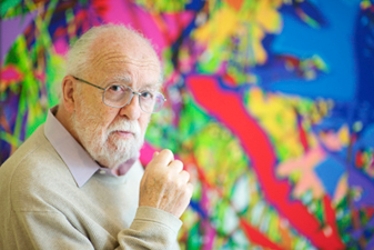

|

|
IN MEMORIAM
Harold Cohen
Professor Emeritus, Department of Visual Arts
UC San Diego
1928-2016
Regarded as a pioneer of computer-generated art for developing AARON-one of the first and most complex computer software programs for creating works of art-Department of Visual Arts Emeritus Professor Harold Cohen died from congestive heart failure at his home in Encinitas, Calif., April 27, 2016. He was 87.
Brought to UC San Diego in 1968 as a visiting lecturer, Cohen was a mainstay of the Visual Arts Department until he retired in 1994. In addition to serving as department chair, he was a founder and director of the Center for Research in Computing and the Arts (CRCA), a ground-breaking collaboration between visual artists and musicians committed to expanding their fields with the application of new technology.
Cohen trained and attained renown as an abstract painter, but in the 1960s, when artists began questioning what art is, Cohen grew weary of the painting and at UC San Diego began to collaborate with a computer scientist interested in artificial intelligences. According the New York Times, he taught himself computer programming and then spent two years at the Artificial Intelligence Laboratory at Stanford University upon an invitation by Edward Feigenbaum, a pioneer in the field. It was at Stanford that Cohen first designed and produced AARON, a computer program for making freehand artistic drawings. From then on, AARON was his artistic doppelganger, his surrogate in the art world, and his life work.
A skilled engineer, Cohen built many display devices to utilize and enhance the artistic intelligence he programmed into AARON: flatbed plotters, a robotic "turtle" that roamed and drew on huge sheets of paper, even a painting robot that mixed its own colors. According to his son Paul Cohen, AARON was an empirical project for which Cohen studied how children draw, examined Native American petroglyphs, interviewed
viewers and experimented with algorithms to discover the symbolic
characteristics of images.
Cohen continued to change and improve AARON throughout his life, creating for his program an artistic development of the sort critics and historians discerned in the great masters. In the 1980s, AARON turned from abstract art of the sort that Cohen had produced when he was a painter, to representational arts, drawing rocks, plants and people. In the 1990s, he added color to AARON's repertoire and in the 2000s, AARON
returned to new and richer forms of abstraction. Cohen exhibited AARON's art at UC San Diego in 2011 under the title, "Collaborations With My Other Self."
For the art world, AARON was at the center of a discourse about the meaning of creativity and the nature of art. Cohen toured the world with AARON, mounting exhibitions at such prestigious art museums and science centers as the Tate Gallery in London, the Stedelijk Museum in Amsterdam, the San Francisco Museum of Modern Art, the Boston Computer Museum, and the Ontario Science Center. In 1985, Cohen represented the United States at the 1985 World's Fair in Tsukuba, Japan, where AARON created more than 7,000 different drawings, many of which were taken home by the visitors.
As AARON's complexity increased, it generated puzzle-like underpaintings
on canvas that Cohen completed by painting-a skill he hadn't exercised in years. AARON's images and Cohen's essays and videos can be viewed at www.aaronshome.com.
Cohen is survived by his partner, the Japanese writer Hiromi Ito; his wife, Becky Cohen, from whom he was separated; a brother, Bernard; his son, Paul Cohen; four daughters, Jenny Foord, Kanoko Nishi-Smith, Sara Nishi and Zana Itoh Cohen and seven grandchildren.
Cristina Della Coletta
Dean, Division of Arts and Humanities
Jack Greenstein
Professor and Chair,
Department of Visual Arts